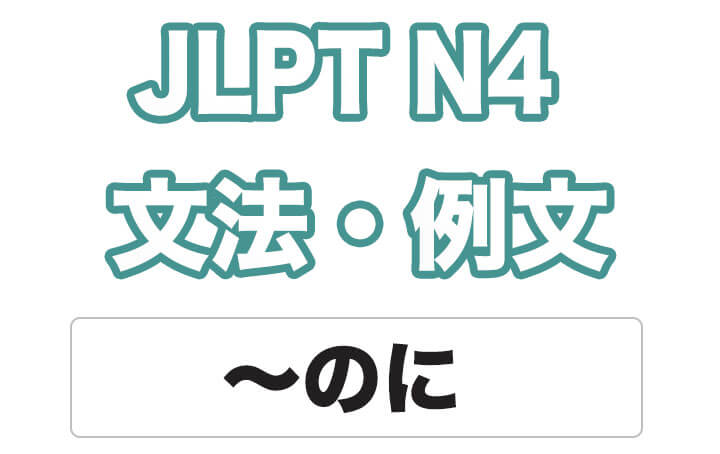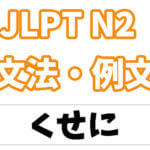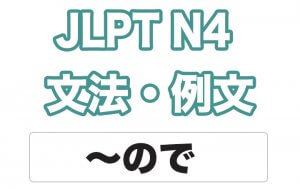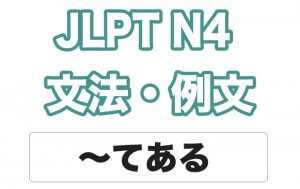
文型1:〜のに(予想外)
[意味]
〜けれど
「当然〜だろう」と予想される事柄とは違った結果になったことを表す。話の手の驚きや不満などの気持ちが含まれる。
[英訳]
"… despite of the 〜"
Often used to show the speaker’s dissatisfaction, regret or feeling that something is unexpected.
[接続]
V(普通形) + のに
イAい + のに
ナA + のに
N + なのに
[JLPT レベル]
N4
例文
薬を飲んだのに、全然良くなりません。
I took the medicine, but I'm not feeling any better at all.
昨日、早くたくさん寝たのに、まだ眠いです。
I slept early and a lot last night, but I'm still sleepy.
トムさんは2年日本へ留学したのに、全然日本語が話せません。
Tom has been studying abroad in Japan for two years, but he still can't speak Japanese at all.
このステーキは高いのに、おいしくないです。
This steak is expensive, but it's not good.
ジェームスさんはイケメンなのに、彼女がいません。
James is handsome, but he doesn't have a girlfriend.
彼はカッコよくないのに、女の子からモテます。
He's not good-looking, but he's popular with girls.
彼女は歌手なのに歌が下手です。
She's a singer, but she's not good at singing.
息子はテスト前なのに、全然勉強しません。
My son isn't studying at all even though he has a test coming up.
この会社は給料が安いのに、仕事がたくさんあって大変です。
This company pays low salaries, but there's a lot of work and it's hard.
全然勉強しなかったのに、JLPT N4に合格できました。
Even though I didn't study at all, I passed the JLPT N4.
今日は日曜日なのに、仕事がたまっているので出勤しなければなりません。
Even though today is Sunday, I have to go to work because I have a lot of work piled up.
息子は部屋が汚いのに、全然掃除しません。
My son's room is dirty, yet he doesn't clean it at all.
毎日、運動しているのに、全然痩せません。
I exercise every day, but I'm not losing weight at all.
頑張って勉強したのに、テストの結果は悪かったです。
Even though I studied hard, I did poorly on the test.
全然勉強しなかったのに、テストの結果は良かったです。
Even though I didn't study at all, I did well on the test.
エアコンをつけているのに、暑いです。
It's hot even though the air conditioning is on.
ボタンを押したのに、ジュースが出てきません。
I pressed the button, but no juice came out.
夜遅いのに、息子がまだ帰ってきません。
It's late at night, but my son still hasn't come home.
彼は行くと言ったのに、来なかった。
He said he would come, but he didn't.
類似文型
文型2:〜のに(用途)
[意味]
物の用途を述べるときに使う表現。
動詞は「使います」を使うことが多い。
[英訳]
This sentence pattern is used with “使います” to tell the purpose of using things.
[接続]
V(辞書形) + のに
N + に
[JLPT レベル]
N4
例文
風呂敷は物を包むのに使います。
Furoshiki is used to wrap things.
この箸はパスタを食べるのに使います。
These chopsticks are used to eat pasta.
これはおにぎりを作るのに使います。
This is used to make rice balls.
これは頭をマッサージするのに使います。
This is used to massage your head.
修正テープは間違いを直すのに使います。
The correction tape is used to correct a mistake.
図書カードは本を借りるのに必要です。
The library card is needed to borrow books.
文型3:〜のに(評価)
[意味]
物や場所などを評価するときに使う表現
[英訳]
This sentence pattern is used with “便利です”, “不便です”, “良いです”, “悪いです” etc to evaluate things and places.
[接続]
V(辞書形) + のに
N + に
[JLPT レベル]
N4
例文
田舎は買い物するのに不便です。
It's inconvenient to do shopping in the countryside.
東京は買い物するのに便利です。
Tokyo is convenient for shopping.
東京は電車が多いので、会社に通うのに便利です。
There are many trains in Tokyo, so it is convenient to go to work.
田舎は電車が少ないので、会社に通うのに不便です。
In the countryside, it is inconvenient to go to work because there are fewer trains.
この靴は運動にいいです。
These shoes are good for exercise.
このカバンは大きいし、旅行に便利です。
This bag is large and convenient for travel.
タブレットは本を読んだり、映画を見たりするのに役に立ちます。
The tablet is useful for reading books and watching movies.
日本のアニメは日本語を勉強するのに役に立ちます。
Japanese anime is useful for studying Japanese.












